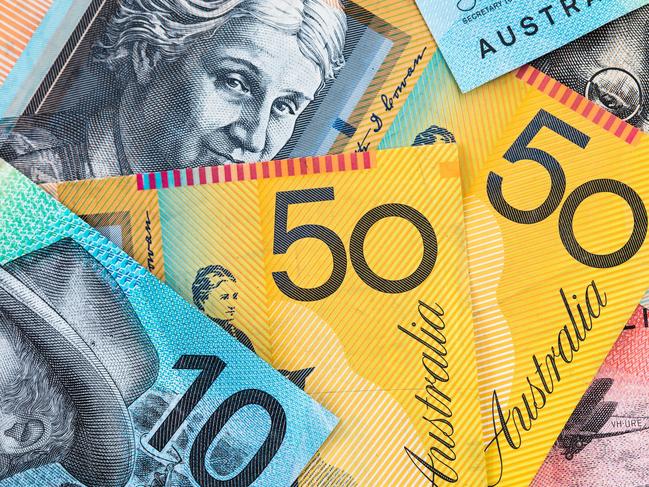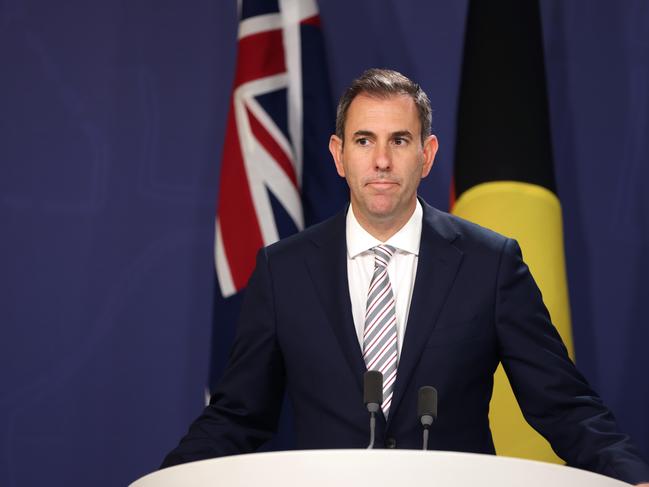Australian gross domestic product expands in September quarter
New figures have revealed the state of the Australian economy as inflation soars, with the Treasurer delivering an ominous message.
NewsWire
Don't miss out on the headlines from NewsWire. Followed categories will be added to My News.
The Australian economy expanded again in the third quarter of this year, but high inflation spells trouble for the months ahead.
Figures from the Australian Bureau of Statistic show gross domestic product grew for a fourth consecutive quarter in the September quarter, lifting by 0.6 per cent — slightly below what economists were expecting.
The economy grew by 5.9 per cent in the 12 months to September, as it rebounded from a trough in the third quarter of 2021 when Covid-19 Delta variant lockdowns forced the economy to contract.
The ABS uses GDP – the total value of goods produced and services provided in the country during the year – to measure how Australia’s economy is faring.
Household spending drove economic growth in the September quarter, suggesting the effects of interest rate hikes consumer spending is yet to be reflected in the national accounts.
The suggestion is backed by Treasurer Jim Chalmers, who, shortly after the figures were announced, said the difficult economic conditions were not behind us, but in fact “ahead of us”.

Household spending increased by 1.1 per cent and contributed 0.6 percentage points to the nation’s gross domestic product, according to Wednesday’s figures.
Australians saved less and spent more, including on discretionary purchases.
Spending on hotels, cafes and restaurants was up 5.5 per cent, transport services and travel leapt by 13.9 per cent and vehicles rose by 10.9 per cent.
The average household saved 6.9 per cent of its income during the September quarter, compared to 6.8 per cent in the December quarter of 2019.
The household saving to income ratio fell for the fourth consecutive quarter, from 8.3 per cent to 6.9 per cent, as increases in household spending outpaced household income growth.
This was despite a large increase in compensation of employees, which increased by 3.2 per cent in the strongest rise since December quarter of 2006.
The release of the national accounts figures on Wednesday comes after the Reserve Bank of Australia hiked interest rates for an eight consecutive month on Tuesday.
The central bank lifted the cash rate by 0.25 per cent to a 10-year high of 3.1 per cent as it continued in its efforts to dampen consumer spending and rein in inflation, which is at a 30-year high in Australia.
RBA governor Philip Lowe said the bank’s board expected interest rates to continue to rise next year.

Treasurer Jim Chalmers welcomed the “solid headline figures” provided in the national accounts on Wednesday.
But he said Australians were feeling the strain of the combined impact of the global energy crisis, cost-of-living pressures and rising interest rates.
“We know that the difficult economic conditions, particularly in the global economy, are not behind us. They are ahead of us,” he said.
The Albanese government has been pursuing a path of relative fiscal restraint to avoid further fuelling inflation rather than offering Australians any cash handouts to help them with the soaring cost of living.
“We are focused on where we can meaningfully make a difference in the context of high inflation and rising interest rates … not just to batten down the hatches against these global conditions but to build a better future that Australians need,” Dr Chalmers said on Wednesday.
Shadow treasurer Angus Taylor said the national accounts data highlighted that cost of living pressures were really starting to hit household budgets.
Mr Taylor said Australian families were having to dig into their savings to pay for Christmas and to keep up with the rapid rise in cost of living.
“Rising interest rates combined with soaring grocery prices, rents and power bills are starting to take a toll on household budgets,” Mr Taylor said.
“While the economy is showing continued signs of strength, the test for Labor is whether it will preserve the strength of the economy while outlining a credible plan to guide us through the tough times ahead.”
Originally published as Australian gross domestic product expands in September quarter


